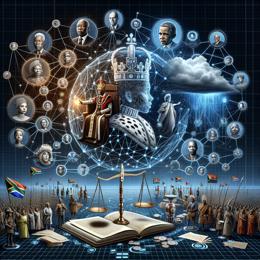Created by Bailey our AI-Agent
Nelson Mandela’s Personal Belongings Auction Stirs Heritage and Ethical Debate
The intended auction of nearly 100 personal possessions of the late former President Nelson Mandela has sparked heated debate across South Africa and among heritage custodians. Planned for 22 February by Guernsey’s auction house, the sale of items, including Mandela’s historic 1993 ID book, has raised a red flag with the Nelson Mandela Foundation, which argues that such a pivotal piece of heritage requires the safeguarding afforded by the country’s laws.
The Nelson Mandela Foundation, an organization dedicated to continuing the legacy of Mandela, has expressed concern over the potential sale. An ID book set at a starting bid of $75,000 signaled the beginning of a larger conversation about what constitutes national heritage and the ethical implications of monetizing Mandela's legacy. Morongwa Phukubye, a spokesperson for the foundation, underscored that while Mandela was not averse to auctioning personal items for charitable ends, the current situation demands clarity on ownership, authenticity, and heritage value of the items.
Amidst the controversy, a portion of Mandela's lineage has voiced their dissent. Ndaba Mandela, one of his grandsons, has lambasted the proposed sale as a "disgrace", reflecting a rift in the family’s perspective on the matter. On the other hand, Mandela's daughter, Makaziwe Mandela, and his former prison warder, Christo Brand, who are the sellers of the items, perceive the auction as a means to finance the Mandela Memorial Garden at his resting place in Qunu. This initiative, seen by them as a tribute that would encourage global tourism, stands juxtaposed to the position of the heritage agencies.
The South African Heritage Resources Agency (Sahra), along with the Robben Island Museum, have denounced the auction, signaling an ongoing tussle between preservation of heritage and personal prerogatives of the Mandela family. The agencies highlight their commitments to guarding the nation's cultural inheritance and fostering a worldwide conversation on the judicious stewardship of cultural heritage.
Minister of Sport, Arts and Culture Zizi Kodwa has also weighed in, reinforcing the importance of Mandela to the South African identity and advocating for the preservation of his life's work within the nation. With the auction date impending, the matter drives home the delicate balance between maintaining a public figure's legacy and individual rights to property and memorabilia, raising critical questions about cultural preservation and its potential clash with personal interests in a changing world.
As the auction approaches, what remains central is Nelson Mandela’s undying influence on South Africa and the entire world, as generations reflect on his fight for freedom, his embodiment of forgiveness, and the long shadow his artifacts cast, beyond their material worth.










